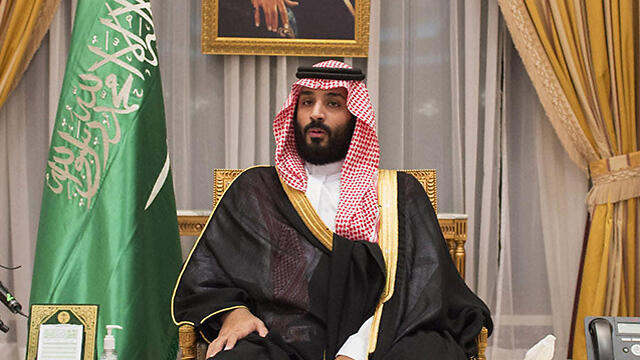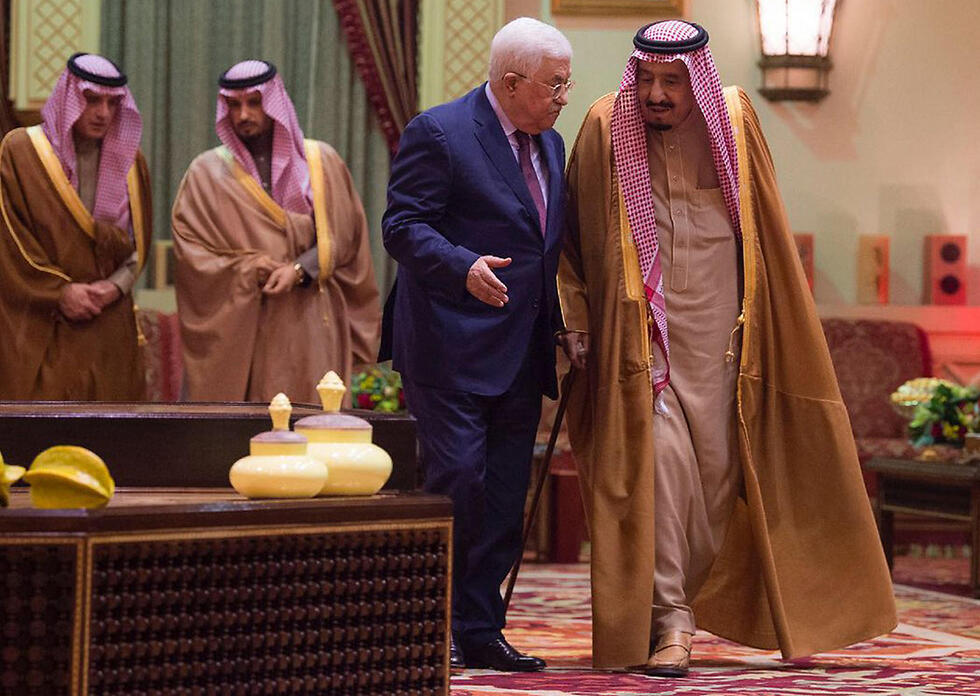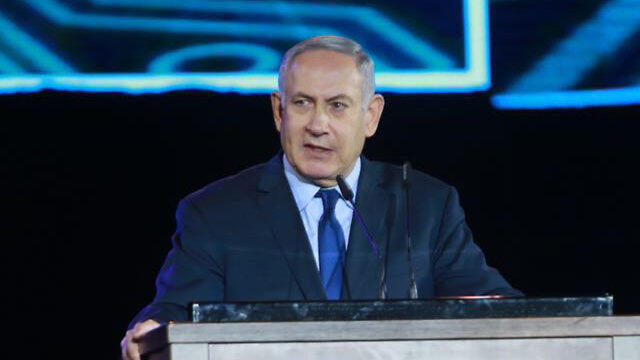Getting your Trinity Audio player ready...
Saudi Crown Prince Mohammad bin Salman has had enough of the Palestinian leadership. “In the past 40 years, the Palestinian leadership has repeatedly missed opportunities and rejected all proposals,” he said during a meeting with several leaders of Jewish organizations in late March. “It’s time the Palestinians accept the proposals… or shut up and stop complaining.”
This isn’t the first time Saudi officials have harshly criticized the Palestinian leadership for consistently missing historic opportunities to solve the conflict, but up until now they have kept it behind closed doors.
4 View gallery


Crown Prince Mohammad bin Salman. The Saudis have often criticized the Palestinian leadership for missing historic opportunities to solve the conflict
(צילום: AFP)
The ties between Riyadh and Jerusalem are perceived by some of the Saudi public as a betrayal of the Palestinian interest and serve as a weapon in the hands of the regime’s opponents. The royal family in Riyadh is required, therefore, to prove that it isn’t “selling” out the Palestinian struggle to advance a normalization with Israel.
The Palestinian issue has never been a top priority in Saudi Arabia, but it has served and still serves as a restraining and limiting factor in the Saudi regime’s attitude towards Israel.
Over the years, there have been historical crossroads in which shared interests were formed between Israel and Saudi Arabia, but they failed to develop into a dramatic change in the status of the relations due to the Saudi regime’s fear of profound criticism in the Arab world that would sabotage its public image and religious status as the protector of Islam’s holy sites.
Key player in changing regional balance of power
Recently, however, as the Iranian enemy and the Islamic State (ISIS) grew stronger, Israel turned from an enemy into a potential ally in the Saudis’ eyes. Not only do the two countries share an identical perception as to the need to eradicate radical elements and stabilize the Middle East, but Israel is the only country in the world with the intentions and military ability to act against the joint enemies.
4 View gallery


Palestinian President Mahmoud Abbas with Saudi King Salman. The royal family in Riyadh is required to prove that it isn’t ‘selling’ the Palestinian struggle to advance a normalization with Israel
(צילום: AP)
Over the years, Saudi Arabia has largely relied on its strategic alliance with the United States, but the American administration’s willingness to get involved in the Middle East’s bloody conflicts has dropped in recent years, and Saudi Arabia has basically been left without any support for its attempts to efficiently curb the Iranian influence. Under these circumstances, Israel has become a key player in changing the regional balance of power.
In addition to its intelligence and strategic abilities, Saudi Arabia sees Israel as as an economic role model. As the Saudi economy undergoes a real revolution from an economy relying on oil to a productive and advanced economy, the Israeli knowledge and technology are becoming more and more attractive.
The potential hidden in Israeli-Saudi normalization is huge. While the relations aren’t symmetrical on the strategic level, in light of Israel’s clear military advantage, this does not lessen their importance. Saudi Arabia’s strategic location and seniority in the Arab world could help Israel improve the fighting against Iran and deepen its security cooperation with other Arab countries. At the same time, Israel is concerned about the advanced arms deals between Saudi Arabia and the US and the possibility of a Saudi nuclear weapon being developed in response to an Iranian nuclear weapon.
Saudi pressure on PA
On the diplomatic level, Israeli-Saudi cooperation could help moderate and soften explosive events, like Temple Mount riots. In addition, it would pave the way to advance economic, energy and agricultural projects between Israel and Arab states, which hardly exist in the current reality.
4 View gallery


A first cinema in Saudi Arabia. The conservative kingdom is undergoing a major reform
(צילום: AP)
The Saudi palace is already pressuring the Palestinian Authority to moderate its demands from Israel. Unlike in the past, Saudi Arabia has withdrawn its demand for a just solution to the Palestinian problem and is now talking about a logical solution. The Saudis, for example, no longer support the Palestinian demand for a right of return; rather, they are pursuing a solution that Israel would find acceptable too.
Furthermore, Riyadh isn’t stipulating that the Israeli-Arab conflict must be solved before Saudi Arabia’s relations with Israel are normalized, but is settling for a breakthrough in the negotiations. As far as Saudi Arabia is concerned, if Israel makes gestures that convey to the Arab world that “there’s something to talk about,” like freezing settlement construction and lifting the siege on Gaza (even partially), it would be possible to reward Israel by increasing the Saudi gestures, in addition to the ones that have been made so far.
On the economic level, if the regime in Riyadh removes the economic barriers and allows the integration of Israeli components and workforce into the Saudi economy, it would have a huge contribution to the Israeli economy, especially if other Arab countries open their gates to Israeli products.
Saudi Arabia and Israel are interested in normalizing their relations. That’s indisputable. But despite the mutual desire, there is still a long and winding road to normalization. In the current reality, Saudi Arabia could perhaps drag the Palestinian leadership to the negotiating table, but it can’t force the Palestinians to sign a document waiving its historical demands from Israel. Israel, for its part, isn’t showing any willingness to comply with the Saudis’ basic demands either. In the current coalition composition, Israeli gestures towards the Palestinians are perceived as a deviation from the government’s ideological stand. Such gestures, therefore, are nowhere on the horizon.
4 View gallery


Prime Minister Benjamin Netanyahu. Saudi Arabia would be able to seek the Israeli intelligence’s help in dealing with Iran and its proxies in the Middle East
(צילום: טל שחר)
The way things look now, the Israeli and Palestinian leaderships are unable to bridge the differences of opinion between them, despite American and Western pressures, which makes the chances of a Saudi-Israeli normalization unclear. Despite the recent dramatic change in the Saudi discourse concerning Israel, it’s unlikely that the conditions have matured for the Saudi leadership to jump over the Palestinian hurdle on its way to normalization with the Zionist enemy.
Israel should do whatever it can to avoid missing the unique window of opportunity that has been opened in its relations with Saudi Arabia. Opportunities are a deluding and passing thing in the Middle Eastern arena, and the similar interests between Israel and Saudi Arabia could fade away if the current circumstances change.
The Israeli government’s most important mission is to restore its credibility in the Saudi regime’s eyes. Normalization with Saudi Arabia won’t be given for free. It has a price. The question is whether Israel is willing to pay that price. The worst thing an Israeli prime minister could do is give the Saudis the feeling that he is willing to make concessions, and then back out of his statement. Saudi Arabia has experienced many disappointments with the Israeli leadership. It mustn’t happen again.
Dr. Michal Yaari is an expert on Saudi foreign policy at Tel Aviv University and the Open University and a thinktank member at Mitvim—The Israeli Institute for Regional Foreign Policies .
This article is based on a research paper about Israel-Saudi relations written as part of the Mitvim Institute’s project on “Israel’s relations with Arab states: The unfulfilled potential.”

